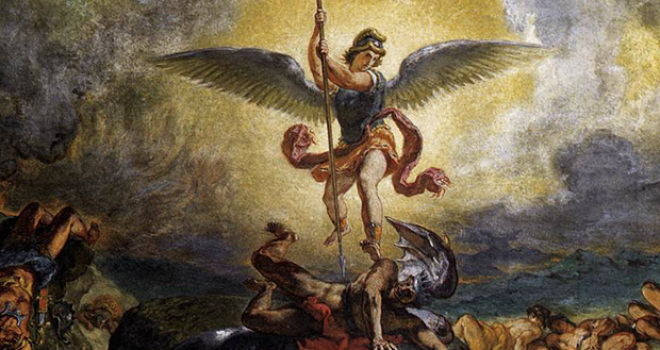Satan is not self-existent.
He was created by God . It can even been said that God created and uses Satan to his own ends (2 Corinthians 12:7).
Satan is not omniscient
Satan is an angel and angels don’t know everything (1 Peter 1:11-12). There is no indication in Scripture that Satan can really read our thoughts despite it is a common belief. Because he’s an expert on human nature, he’s pretty good at predicting our behavior and can easily tempt and corrupt weak humans.
Satan is not omnipotent
Because of this limitation, many references to Satan or the devil include his whole kingdom. The person of Satan does not personally tempt each of us for he simply cannot do that. Satan must rely on the following agents to carry out his temptation: (1) his network of demons, (2) the world system which lies under his control (1 John 5:19), (3) carnal or ignorant Christians he is able to use as he did Peter (Matt. 16:22-23), (4) unbelievers under his influence or domination (Luke 22:1-6; Eph. 2:2; Rev. 13). Therefore, he can be resisted and made to flee (Jam. 4:7), but only by the strength of God made available to believers in Christ (Eph. 6:10-18).
Satan is not omnipresent
Demons cannot be everywhere at once and this is true of Satan. However, as the chief of his demons forces or as the “prince of the power of the air” (Eph 2:2), he is chief of a vast host of demons who are so numerous as to make Satan’s power and presence seem to be practically ubiquitous or everywhere at once (cf. Mark 5:9).
Satan is not sovereign
Satan never has cast off the government of God, since the rebellion totally failed. He has been exiled to the earth and the domain around it (Ephesians 2:2). Satan’s chain stretches just so far and God allows him to go that far and no farther. He operates completely within the sphere of God’s allowance (e.g. Job 1:12; 2:6).
It is written in the first chapter of Job that when the Satan presented himself before God, He asked him, “Whence commest thou?” Lucifer answers “From going to and fro in the earth, and from walking up and down in it.”
God begins to boast to Lucifer about his servant Job, saying that there is no man like him, that he is a perfect and upright man. Lucifer cuts God off and asserts that Job is only a holy man because he enjoys God’s blessings. He says he can make Job curse God to his face if God removes his protection. God takes the Devil up on this gentleman’s wager, saying to Lucifer “Behold, all that he hath is in thy power; only upon himself put not forth thy hand.” The events in the Book of Job are the result.
We may gather from this fable that Lucifer is not bound to hell exclusively, but is only bound not to injure those humans who are afforded the protection of God. A human being is protected by God for so long as he or she remains obedient. When a person defies the will and commandments of God, then he or she becomes prey for Lucifer.

Satan can be beaten by Jesus and Christian faith
The truth is that “his infernal majesty” is bound and is powerless before the Son of God (Mark 3:27). Christ defeated Satan and all spiritual forces of evil at the cross (John 12:31; Colossians 2:14-15).
The apostle John tells us: “for this purpose the Son of God was manifested, that he might destroy him that had the power of death, that is, the devil.”
Jesus says: “Fear not; I am the first and the last: I am he that liveth, and was dead; and behold, I am alive for evermore, Amen; and have the keys of Hades and of death” (Rev. 1:17,18).
According to the Catholic Church, Christ delivered men from the bondage of Satan by the victory of the Cross and at the same time paid the debt due to Divine justice by shedding his blood in atonement for our sins.
In their endeavors to explain this great mystery, some old theologians, misled by the metaphor of a ransom for captives made in war, came to the strange conclusion that the price of Redemption was paid to Satan. But this error was effectively refuted by St. Anselm, who showed that Satan had no rights over his captives and that the great price wherewith we were bought was paid to God alone.
Under ordinary circumstances Lucifer cannot directly hurt persons under God’s protection, which is why he needed a special dispensation from God to injure Job’s property and family.
However, we are able to gather from other hints in the Bible and in Christian and Jewish folklore that Satan is free to suggest to human beings that they voluntarily defy God. Once a person does so, he or she forfeits the protection of God. Then Lucifer is permitted to commit injuries upon the person. What is true of Lucifer himself applies to his agents, the demons.
Demons are tempters of men because they are forbidden to injure human beings who obey God. But if through the temptation of a demon a person can be induced to disobey God, that person is demon fodder. Effectively, they join Lucifer’s army of apostate fallen angels, although at a very subordinate rank.
From a Fundamentalist Christian point of view, all those who fail to worship Christ are disobedient to God, and therefore prey for the demons who walk and swim and fly upon the earth. Much the same belief concerning those of other religions is held by Fundamentalist Islamics and Jews. We have the promise that God will not allow us to be tempted beyond our capacity (1 Corinthians 10:13).
Those who are in Christ can overcome Satan (Revelation 12:11; Romans 16:20; 1 John 2:13-14). Christ keeps us safe and Satan cannot lay hold of the believer to harm him (1 John 5:18).
Demonic powers cannot separate us from God’s love in Christ (Romans 8:37-39). If we use the armor of God, we have God’s promise that we can take our stand against the devil’s schemes (Ephesians 6:11,13).








